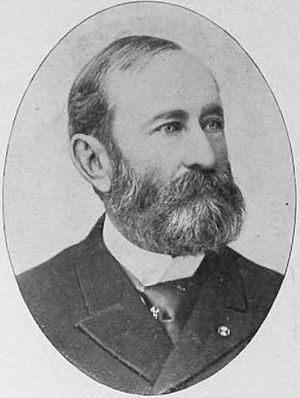Alexander Warner facts for kids
Quick facts for kids
Alexander Warner
|
|
|---|---|
 |
|
| 16th Secretary of State of Mississippi | |
| In office June 1865 – August 12, 1869 |
|
| Preceded by | C. A. Brougher |
| Succeeded by | Henry Musgrove |
| 44th State Treasurer of Connecticut | |
| In office 1887–1889 |
|
| Preceded by | V. B. Chamberlain |
| Succeeded by | E. Stevens Henry |
| Member of the Mississippi Senate from the 12th district |
|
| In office January 1870 – January 1876 |
|
| Member of the Kansas House of Representatives from the 25th district |
|
| In office January 20, 1893 – January 1895 |
|
| Personal details | |
| Born | January 10, 1827 Smithfield, Rhode Island, U.S. |
| Died | September 6, 1914 (aged 87) Point Pleasant, New Jersey, U.S. |
| Political party | Republican |
| Children | 2 |
| Military service | |
| Allegiance | |
| Branch/service | Army |
| Years of service | 1861-1863 |
| Rank | Colonel |
| Commands | 3rd Connecut Volunteer Infantry Regiment 13th Connecticut Infantry Regiment 5th Louisiana Infantry Regiment |
| Battles/wars | Civil War |
Alexander Warner (born January 10, 1827 – died September 6, 1914) was an American soldier, banker, and politician. He was a member of the Republican Party. Warner held important jobs like being the Secretary of State for Mississippi, the State Treasurer for Connecticut, and a representative in the Kansas House of Representatives.
Contents
About Alexander Warner
Alexander Warner was born on January 10, 1827, in Smithfield, Rhode Island. His parents were Thomas and Amy Warner. In 1834, his family moved to Woodstock, Connecticut.
He went to school at Woodstock Academy and Wesleyan Academy. Before becoming a soldier and politician, he owned and managed a factory that made cotton twine.
Military Service
Warner was one of the first people to join the army when the American Civil War began. On May 14, 1861, he became a major in the 3rd Infantry of Connecticut Volunteers.
His unit fought in the First Battle of Bull Run on July 21, 1861. The 3rd Infantry finished its service on August 12, 1862.
Warner was then made a lieutenant colonel of the 13th Connecticut Infantry Regiment in January 1862. He was sent to Louisiana. After the Union army captured New Orleans, Warner was promoted to colonel. He led his unit in battles like the Battle of Georgia Landing, the Battle of Irish Bend, and the Siege of Port Hudson.
He later had to leave the army temporarily because he was sick. When he returned, he helped create the 5th Louisiana Infantry Regiment. This group defended New Orleans for the Union. He resigned again on August 12, 1863, due to health problems.
After the war, Warner bought a large farm in Madison County, Mississippi. He hired formerly enslaved people, known as freedmen, and paid them for their work.
Political Career
Alexander Warner served in important political roles in three different states.
In Mississippi
In June 1865, the military appointed Warner as the Secretary of State of Mississippi. He held this position until August 12, 1869.
From 1870 to 1876, he was a senator in the Mississippi Senate. He represented Madison County. For some of that time, he was also the President Pro Tempore, which means he was a temporary leader of the Senate. In 1876, he was a commissioner from Mississippi for the Centennial Exposition, a big exhibition celebrating 100 years of the United States.
In Connecticut
In 1877, Warner moved to Pomfret, Connecticut, and bought a farm called "Woodlawn." He was elected as the 44th State Treasurer of Connecticut. He served in this role from 1887 to 1889.
While in Connecticut, he was also part of the State Board of Agriculture. He represented Connecticut at several important celebrations. These included the Centennial celebration in Philadelphia (1887), the Ohio Centennial (1888), and the New York Centennial (1889).
In Kansas
In 1890, Warner moved to Baxter Springs, Kansas. There, he became the president of the Baxter Bank. In 1892, he was elected to the Kansas House of Representatives. He represented the 25th district and started his term on January 20, 1893. In 1896, he ran for the position of Lieutenant Governor of Kansas as a Republican.
Later Life
Alexander Warner passed away on September 6, 1914, in Point Pleasant, New Jersey. He had been sick for two weeks. He was buried at Woodstock Hill Cemetery in Woodstock, Connecticut.
Personal Life
Alexander Warner married Mary Trumbull Mathewson on September 27, 1855. Mary was the great-granddaughter of William Williams, who signed the Declaration of Independence.
They had two children together:
- Benjamin Silliman Warner, born on September 24, 1856.
- Arthur McClellan Warner, born on April 13, 1860, who died when he was a child.
 | Delilah Pierce |
 | Gordon Parks |
 | Augusta Savage |
 | Charles Ethan Porter |

